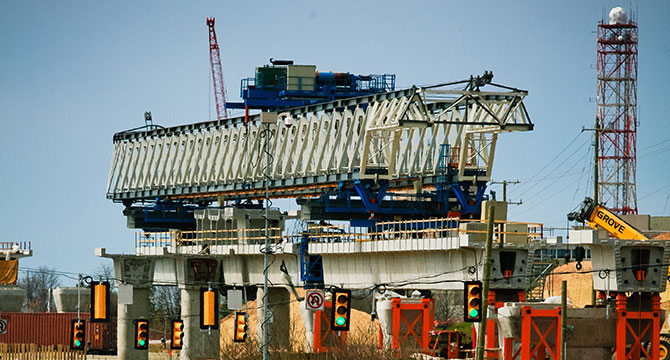The design industry has seen a proliferation of mega-projects in recent years, particularly in the civil infrastructure arena. Mega-projects are not only massive in scale and scope, they involve managing large budgets, diverse teams, ambitious schedules,
and a formidable amount of risk. To be successful, these projects require, at a minimum, solid expertise and exceptional project management.
Mega-projects are often identified by their impressive budgets—typically $1 billion or more. Years in the planning, these projects are high-visibility, high-impact initiatives carried out under the watchful supervision of government agencies and
authorities, or in some examples, resourceful public-private partnerships. In every case, these projects proceed, as they should, under intense public scrutiny from the earliest conceptual phases through construction completion.
Ingredients for Success
With several mega-projects completed or underway in the transportation sector, Dewberry’s alternative project delivery team has developed a clear strategy for the successful management of these large-scale efforts. Our decision to pursue mega-projects
is based on our ability to meet several criteria:
- Expertise: This is the bottom line. We must have the expertise—in-house or through strategic teaming—to provide all of the services required with complete confidence. There is no opportunity for a learning curve on these massive
projects.
- A Trusted Team: Mega-projects require trusted partnerships. People involved with the day-to-day delivery of services are at the heart of these teaming arrangements, but a successful team also involves solid company support from every part of
our internal organization as well as every participating consultant and contractor, starting at the top of the organizations.
- Clear Understanding of Scope: A careful evaluation of the project scope requires time and a willingness to commit to the pre-proposal schedule and financial demands necessary to create a thorough and effective response. This also enables the
team to establish mitigation measures early on to minimize risk.
- Strong Project Controls: From start to finish, mega-projects require reliable and consistent project controls, from the scope evaluation to cost estimating, and from scheduling to the production of documents.
- Follow-Through: With many mega-projects involving design-build delivery, it is vital that the design firm stay engaged throughout construction, reviewing shop drawings and RFIs and answering questions. The engineering commitment continues through
the final day of construction.
Driving Innovation
One of the significant benefits to taking on large-scale, design-build projects is the opportunity to innovate. These projects have many components, all subject to value-driven analysis and ideas to save money, trim schedules, and conserve natural resources.
The magnitude of these projects, along with the inherent risk, incentivizes teams to look closely at every detail in terms of the site, use of materials, construction methodology, and more to optimize efficiency and enhance delivery.
It All Comes Down to People
Mega-projects are “big rewards, big risk” projects. Success comes down to that trusted team, and people who are committed throughout the life of the project. These projects are by their nature complex and challenging, so issues arise on a
daily basis. It is important to have a team that works together constructively—not combatively—with people at every level of the job who view these projects as true career highlights. The opportunity to work on a mega-project doesn’t
come along every day. At Dewberry, we are fortunate to have a team that stands ready for the challenge.

The Silver Line: A Project with Mega Impact
Mega-projects such as the $1.18 billion second phase of the Dulles Corridor Metrorail, also known as the Silver Line, require an “all-in” commitment from participating design and construction firms. Dewberry’s extensive, six-year involvement
in the engineering and construction inspection for Phase II has involved more than 15 business units, with designers contributing from across the firm’s national network of offices as well as the construction inspection team. The 11.4-mile extension,
nearing completion by the design-build team of Capital Rail Constructors for the Metropolitan Washington Airports Authority, is set to open in 2020.
On the Road: Teaming Up with Shirley Contracting
The latest phase of the widening of State Route 28 in Northern Virginia—an award-winning mega-project that has spanned 15 years—is among the more than 40 design-build projects completed by the team of Dewberry and Shirley Contracting Company,
LLC, in Virginia and Maryland. Proven partnerships, with trusted teams working closely together, are vital to the success of large-scale, high-profile initiatives.